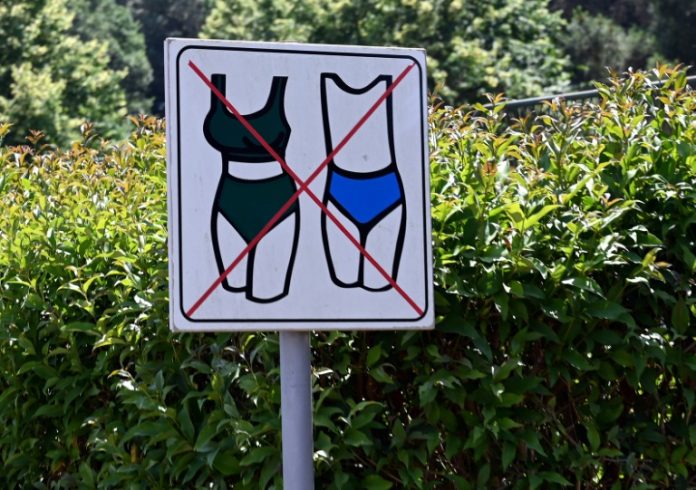As an early pioneer of nudism, Croatia’s idyllic Adriatic coast has a long and storied history of people stripping down to swim and commune with their surroundings in the naturist tradition.
But as the once wildly popular trend struggles to attract new followers, devotees are grappling with how to harness Croatia’s booming tourism industry to revive the glory days.
“For me, naturism is freedom,” says Dusan Salomon, a Slovenian who has been visiting Croatia’s largest naturist camp with his wife for nearly 50 years.
The 65-year-old, who lives in Germany, also jokes that it is a frugal style of vacationing since they save money on swimsuits.

“Everyone feels more free (here), one is what one is,” adds his wife Katarina, sitting in the shade next to their camp trailer.
The couple consider themselves lucky to have a daughter and 20-year-old grandson who also join them for summers at Koversada, the sprawling naturist complex based around an islet off Croatia’s northwestern Istria peninsula.
By and large, the camp clientele is aged over 40.
“For younger generations, naturism is simply not sufficiently attractive, as it was to their parents,” says Nenad Skuflic, camping manager of Adris Group, which runs Koversada.

At the camp, whose pine forested grounds spread out over some 100 hectares (nearly 250 acres), guests are generally naked as they stroll around, play sports or ride bicycles outdoors.
But they are requested to be dressed when inside a restaurant or shop.
Koversada has around 5,000 guests at a time, staying in tents, camping vans or apartments.
Yet that is a far cry from its heydey in the 1980s, when, typically in summer, up to 15,000 campers could be booked in.
Koversada opened in 1961 as Europe’s first commercial naturist camp.
But Croatia’s nudism story dates back to the 1930s, on the northern island of Rab.

It was in those turquoise waters that Britain’s King Edward VIII and his future wife, American socialite Wallis Simpson, famously went skinny-dipping in 1936.
“All major European papers covered that, it was a huge promotion for naturism from which we profited greatly without even being aware,” says Jerko Sladoljev, who set up the country’s campsite association and formerly headed the Istria tourism body.
An Austrian professor had opened in 1934 Croatia’s first naturist camp on that island in response to another world figure – Adolf Hitler.
The Nazis had banned “free body culture” sites in Germany, considered the cradle of the naturist movement.

That sent followers flocking to the coastline of Croatia, then part of Yugoslavia.
Although predominantly Catholic, Croatia – unlike other Catholic countries such as nearby Italy or Spain where nudism was frowned upon – was more tolerant, as people had grown used to the trend by then. Additionally, the Church did not wield much influence under communism.
By the mid-1980s, Croatia had 34 nudist camps, leading the market along with France and Germany.
Today that number is down to nine.
The decline started in the late 1980s after other European countries like Italy and Spain started opening up their first naturist facilities and naturism globally became less attractive.

The 1990s independence war badly hit Croatia’s tourism, though loyal nudists continued to summer there in Istria, which was spared the violence.
The industry has since rebounded but the focus has remained firmly on so-called “textile camps” where people keep their clothes on.
Experts believe that the future of Croatia’s naturism could now lie in small, high-end facilities run by afficionados rather than big corporations.
“‘Boutique naturism’ with small camps or apartment settlements, privately-run, that could make a new offer, could be a renaissance and a market niche,” Sladoljev said.

In a bid to stay relevant, another nudist camp in Istria, Valalta, has recently invested in apartments, beaches and attractions for children.
Since 2013, it has been named annually one of the best campsites in Europe by Germany’s largest auto club, ADAC.
To bolster their ranks, Croatia’s naturists have a large pool to draw from — last year, nearly 19 million tourists visited the country of 4.2 million people, heading mainly to its shimmering Adriatic coast.
Only around 300,000 of them are nudists – mostly Germans, Slovenes, Austrians and Dutch – according to estimates.
But at least 10 percent of tourists are believed to occasionally swim naked, either on official nudist beaches or secluded “wild” sites.
















